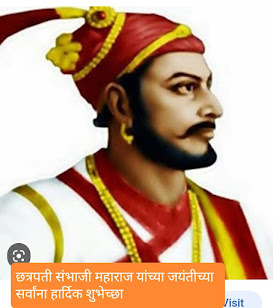A blog about activity based learning ,evaluation of std 11 and 12 English.
Saturday, 18 November 2023
Unlocking Success: Study Smarter, Not Harder
Friday, 17 November 2023
Group Discussion: Trending Topics
Monday, 23 October 2023
Mind Mapping on Soft Skills
Sunday, 28 May 2023
Vinayak Damodar Savarkar: The Revolutionary Nationalist
Vinayak Damodar Savarkar: The Revolutionary Nationalist
 |
| Veer Savarkar |
Early Life and Education of Veer Savarkar
Savarkar's Contribution to Indian Independence Movement
His Literary and Intellectual Contributions
His Legacy and Controversies
Tuesday, 16 May 2023
Tadoba Andhari Prakalp: Unveiling the Marvels of Nature's Paradise
Tadoba Andhari Prakalp Wildlife Expedition
Introduction:
Nestled in the heartland of India, the Tadoba Andhari Prakalp is an awe-inspiring wildlife sanctuary that holds the key to unravelling nature's secrets. Known for its rich biodiversity, lush landscapes, and thriving wildlife, this hidden gem beckons adventure seekers, nature lovers, and wildlife enthusiasts from all corners of the world. Embark on a virtual journey with us as we explore the wonders of Tadoba Andhari Prakalp and delve into its captivating allure.
A Sanctuary for the Wild:
Spanning across the districts of Chandrapur and Gadchiroli in Maharashtra, Tadoba Andhari Prakalp is a sanctuary like no other. Established in 1955 as a tiger reserve, it was named after the Tadoba Lake and the Andhari River that flow through its core. With a sprawling area of over 1,700 square kilometers, the sanctuary offers a safe haven for a diverse range of flora and fauna.
Captivating Wildlife:
Tadoba Andhari Prakalp is home to a thriving ecosystem that supports an impressive array of wildlife. The sanctuary is particularly renowned for its tiger population, making it one of the best places in India for tiger sightings. Other majestic inhabitants include leopards, sloth bears, gaur, nilgai, sambar deer, and spotted deer, to name just a few. Bird enthusiasts will be enthralled by the sight of over 200 species of birds, including the crested serpent eagle, paradise flycatcher, and the endangered Indian vulture.
Exploring the Wilderness:
Embarking on a safari through the dense forests of Tadoba Andhari Prakalp is an adventure like no other. The sanctuary offers both jeep and elephant safaris, allowing visitors to immerse themselves in the wilderness and witness nature's wonders up close. Experienced guides accompany these safaris, sharing their expertise and insights about the flora and fauna that call this sanctuary home.
Ecotourism and Conservation:
Tadoba Andhari Prakalp is committed to sustainable ecotourism and wildlife conservation. The sanctuary is actively involved in various initiatives to protect and preserve its fragile ecosystem. Efforts are made to create awareness among visitors, ensuring they understand the importance of conservation and minimizing their impact on the environment. Additionally, the sanctuary actively engages with local communities, fostering their participation in conservation efforts and offering them livelihood opportunities through eco-tourism initiatives.
Beyond Wildlife:
While Tadoba Andhari Prakalp is primarily known for its wildlife, the sanctuary has more to offer. The picturesque landscape, dotted with lakes, grasslands, and rugged hills, provides a breathtaking backdrop for nature enthusiasts. The Moharli and Tadoba Lake offer tranquil spots for birdwatching and unwinding amidst nature's serenity. The nearby Tadoba National Park Museum provides valuable insights into the region's rich natural and cultural history.
Conclusion:
Tadoba Andhari Prakalp stands as a testament to India's commitment to preserving its natural heritage. With its diverse wildlife, stunning landscapes, and dedicated conservation efforts, this sanctuary is a must-visit destination for those seeking an authentic encounter with nature. Whether it's the thrill of a tiger sighting or the tranquil beauty of the surrounding wilderness, Tadoba Andhari Prakalp promises an unforgettable experience that will leave visitors in awe of the wonders of the natural world. So, pack your bags, embrace the wild, and embark on a journey to this paradise nestled in the heart of India
Sunday, 14 May 2023
Sambhaji Maharaj: The Extraordinary Life of a Warrior King
Sambhaji Maharaj Early Life and Royal Lineage:
Warrior Training and Skills:
Challenges and Trials:
Leadership and Governance:
Military Campaigns and Diplomacy:
Legacy and Sacrifice:
Conclusion:
Wednesday, 10 May 2023
Ravindranath Tagore: The Poet of Infinite Dimensions
Ravindranath Tagore: The Poet of Infinite Dimensions
Introduction:
Early Life and Education:
Journey as a Writer and Poet:
Beyond Poetry: Tagore's Multifaceted Talents:
A Visionary Educator:
Legacy and Impact:
Featured Posts
-
Maharashtra State Board of Secondary and Higher Secondary Education Sub. : English Std. Xll Activity Sheet Format (80 Marks) Subject — Compu...
-
A statement of Purpose (SOP) is an essay type application made to a university to seek admission to a particular course. Click here for Gro...
-
Write a review of the film that you remember you‟ve watched and can‟t forget easily. Give details about the movie using following supporti...
.jpeg)

